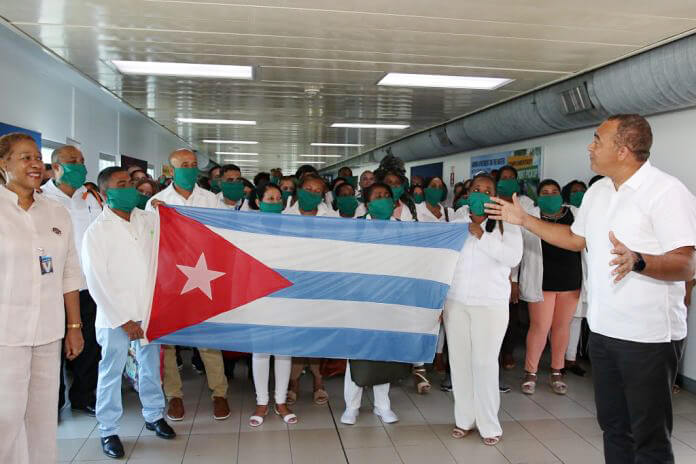Shortly before Pope Benedict XVI met with Cuban President Raúl Castro for a courtesy visit at the Palace of the Revolution in Havana, Miami’s Archbishop Thomas Wenski, who led about 800 pilgrims from Florida, assailed the communist island’s Marxist ideologies.
During a mass in Havana at the capital city’s oldest cathedral, Wenski invoked Pope John Paul II, who visited Cuba in 1998, calling for more freedoms in the Spanish-speaking Caribbean island.
In reiterating Pope Benedict’s earlier criticism of Marxism as being “a spent ideology,” Wenski urged Cubans to be the “protagonist of their own future.”
He said the pope and the Catholic Church in Cuba desire a political system that grants dignity to all people.
During his near hour-long meeting with Castro, Benedict asked the president to declare a holiday for Good Friday, when Catholics commemorate the death of Jesus Christ.
The request was a follow-up of sorts to Cuba’s decision to declare Christmas a national holiday in honor of John Paul’s 1998 visit. Cubans hadn’t had Christmas off for nearly 30 years.
“It’s not that it changes reality in a revolutionary way, but it can be a sign of a positive step, as was the case of Christmas after John Paul’s visit,” said the Vatican spokesman, the Rev. Federico Lombardi.
Pope Benedict also raised “humanitarian” issues with Raul Castro, an apparent reference to political prisoners.
But Marino Alberto Murillo Jorge, Cuba’s minister of economy and planning, has ruled out political change following Benedict’s call for Cubans to “strive to build a renewed and open society, a better society, one more worthy of humanity, and which better reflects the goodness of God.”
Murillo addressed foreign journalists on Mar. 27 about the island’s economic changes, but added, “In Cuba there will not be political reform.”
Nonetheless, Cuban dissidents have seized on the pope’s visit to shine light on the Communist government’s treatment of those with opposing political views.
The government has been closely following the activities of dissidents, particularly the Ladies in White, a small movement of women who wear white and gather at Masses at Catholic churches in Cuba to protest the treatment of the island’s prisoners of conscience.
On Mar. 28, Pope Benedict XVI wrapped up his visit with an open-air Mass in the shrine of the Cuban revolution. He also met with former President Fidel Castro, Raúl’s elder brother.
“I will happily greet His Excellency Pope Benedict XVI as I did John Paul II, a man for whom contact with children and the humble raised feelings of affection,” Castro had written the day before.


























